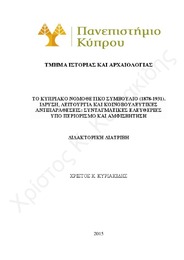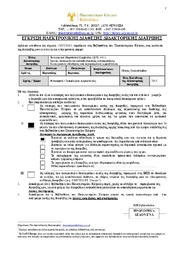| dc.contributor.advisor | Παπαπολυβίου, Πέτρος | el |
| dc.contributor.author | Κυριακίδης, Χρίστος Κ. | el |
| dc.coverage.spatial | Κύπρος | el |
| dc.coverage.spatial | Cyprus | en |
| dc.creator | Κυριακίδης, Χρίστος Κ. | el |
| dc.date.accessioned | 2015-09-01T06:37:18Z | |
| dc.date.accessioned | 2017-08-03T10:32:05Z | |
| dc.date.available | 2015-09-01T06:37:18Z | |
| dc.date.available | 2017-08-03T10:32:05Z | |
| dc.date.issued | 2015-07 | |
| dc.date.submitted | 2015-07-15 | |
| dc.identifier.uri | https://gnosis.library.ucy.ac.cy/handle/7/39347 | en |
| dc.description | Περιέχει βιβλιογραφία (σ. 524-539). | el |
| dc.description | Αριθμός δεδηλωμένων πηγών στη βιβλιογραφία: 199 | el |
| dc.description | Διατριβή (Διδακτορική) -- Πανεπιστήμιο Κύπρου, Φιλοσοφική Σχολή, Τμήμα Ιστορίας και Αρχαιολογίας, 2015. | el |
| dc.description | Η βιβλιοθήκη διαθέτει αντίτυπο της διατριβής σε έντυπη μορφή. | el |
| dc.description.abstract | Η παραχώρηση Νομοθετικού Συμβουλίου στην Κύπρο ήταν μια καινοτόμα ενέργεια και μια ρηξικέλευθη απόφαση της κυβέρνησης της Βρετανικής Αυτοκρατορίας, η οποία υλοποιήθηκε σχεδόν αμέσως μετά την κατάληψη του νησιού, το 1878. Το παραχωρηθέν, όμως, «εμβρυώδες» διορισμένο Νομοθετικό Συμβούλιο δεν ικανοποίησε τις προσδοκίες των κατοίκων, ενώ και οι ίδιοι οι βρετανοί αξιωματούχοι επικεντρώθηκαν στους τρόπους απόδοσης αιρετού Συμβουλίου, διασφαλίζοντας τόσο τις εξουσίες του Στέμματος, όσο και (εμμέσως) τα συμφέροντα της μειοψηφούσας τουρκικής κοινότητας, μέσω της επιδίωξης της διαρκούς τουρκοβρετανικής συνεργασίας εντός αυτού. Ο φυλετικός / εθνικός διαχωρισμός ενισχύθηκε περισσότερο με τη δημιουργία ξεχωριστών εκλογικών καταλόγων, με τη δικαιολογία ότι σε περίπτωση ενιαίου εκλογικού σώματος η πλειοψηφούσα ελληνική κοινότητα θα καθόριζε την εκλογή όλων των βουλευτών.
Στόχος της παρούσας εργασίας είναι η παρουσίαση και εξέταση των διαταγμάτων με τα οποία τέθηκε σε ισχύ το Νομοθετικό Συμβούλιο αρχικά το 1878 και τροποποιήθηκε μετέπειτα, το 1882 και το 1925, αλλά τον τρόπο που αυτό λειτουργούσε μέσω θεσμοθετημένων διαδικασιών. Επιπρόσθετα, γίνεται διεξοδική ανάλυση του τρόπου εκλογών για την ανάδειξη των μελών του και των κριτηρίων εκλογής, αλλά και μια σύντομη παρουσίαση των εκλογικών αναμετρήσεων.
Το μεγαλύτερο τμήμα της εργασίας καλύπτει η παρουσίαση και ανάλυση των κοινοβουλευτικών συζητήσεων εντός του Νομοθετικού Συμβουλίου, στηριγμένη στη συστηματική ανάλυση των Πρακτικών του Συμβουλίου. Σε αυτές διαφαίνονται οι πολιτικές προτεραιότητες των τριών πτερύγων της Βουλής (Βρετανών, Ελλήνων και Τούρκων), αλλά και οι κατά καιρούς προσπάθειες συνεργασίας τους με στόχο την οικονομική ανάπτυξη του νησιού.
Όπως φαίνεται από τη διατριβή, μέχρι και τα μέσα της δεκαετίας του 1890, οι αιρετοί βουλευτές, σε συνεργασία με τα επίσημα μέλη προσπαθούσαν να θέσουν τις βάσεις οργάνωσης της διοίκησης του νησιού, να προωθήσουν τη βελτίωση των συνθηκών διαβίωσης των κατοίκων, σε ήπιο, αναγνωριστικό κλίμα. Εντούτοις, εμφανίστηκαν και τα πρώτα ψήγματα αντιπολίτευσης, κυρίως από πλευράς των Ελλήνων μελών του Συμβουλίου, που εκφράζονταν μέσω της προσπάθειας ελέγχου του προϋπολογισμού και μείωσης της μισθοδοσίας των ανώτερων βρετανών αξιωματούχων. Με την πάροδο των ετών, και την έξαρση των ιδεών του εθνικισμού ανάμεσα στις δύο κοινότητες, άρχισαν να εκδηλώνονται και οι πρώτες αντιπαραθέσεις μεταξύ των μελών τους. Ιδιαίτερα με την εκδήλωση του αρχιεπισκοπικού ζητήματος και την ανάπτυξη του ενωτικού κινήματος, που είχε ως αποτέλεσμα τη σκλήρυνση της πολιτικής των Ελλήνων βουλευτών απέναντι στην τοπική κυβέρνηση, οι Τούρκοι συνάδελφοί τους υιοθέτησαν στάση αντίδρασης έναντι των αιτημάτων των πρώτων, απορρίπτοντάς τα, σε συνεργασία με τα βρετανικά επίσημα μέλη. Οι σχέσεις των δύο ομάδων των αιρετών βουλευτών καθορίζονταν βέβαια και από τις εξελίξεις στην Ελλάδα και την Οθωμανική Αυτοκρατορία, όπως και τις πολεμικές αναμετρήσεις μεταξύ τους, ή το κλίμα συνεννόησης στις ελληνοτουρκικές σχέσεις, που επέφερε και την αντίστοιχη αυξομείωση της έντασης και ενίοτε και τη συνεργασία Ελλήνων και Τούρκων βουλευτών στο Νομοθετικό Συμβούλιο. Από την άλλη, την έλλειψη συνεργασίας μεταξύ Ελλήνων και Τούρκων επιδίωκαν και οι ίδιοι οι Βρετανοί.
Ο στόχος των εκπροσώπων της κάθε πλευράς σε όλη την περίοδο λειτουργίας του Νομοθετικού Συμβουλίου δεν ήταν μονοδιάστατος. Αφενός όλοι επιθυμούσαν τη βελτίωση του τρόπου διαβίωσης των κατοίκων. Αφετέρου όμως, οι μεν Βρετανοί επιδίωκαν τη διασφάλιση της κτήσης και τη διοίκησή της χωρίς προβλήματα, αναζητώντας τη συνεχή σύμπραξη με τους Τούρκους βουλευτές, οι οποίοι ακολουθούσαν αντιπολιτευτική στάση προς τους Έλληνες, οι οποίοι με τη σειρά τους έθεταν κυρίως το ζήτημα της ένωσης ακολουθώντας έντονη «αντιδραστική πολιτική» προς τους Βρετανούς. Τελικώς, οι στάχτες του Κυβερνείου, τον Οκτώβριο του 1931, έμελλε να οδηγήσουν στην οριστική απόσυρση και των, όποιων, συνταγματικών ελευθεριών του κυπριακού λαού… | el |
| dc.description.abstract | The granting of a Legislative Council to Cyprus was an innovative action and a groundbreaking decision of the British Empire, which was implemented almost immediately after the acquisition of the island. This “embryonic” appointed Legislative Council, however, did not satisfy the inhabitants while British officials themselves focused on granting an elected Council; safeguarding, thus, the Crown rule, as well as the interests of the Turkish minority community through the pursuit of a continuous Turkish-British cooperation therein. Racial segregation was further amplified with the creation of separate electoral lists on the grounds that with a unified electoral body, the Greek majority community would determine the election of all members.
The aim of this study is to present and examine the Orders by which the Legislative Council came into force, in 1878 and amended, thereafter, in 1882 and 1925, but also the way it operated through institutionalized procedures. In addition, an analysis of the mode of electing the Council’s members and the election criteria is made, followed by a brief presentation of the elections.
The major part of this project covers the presentation and analysis of the Discussions within the Legislative Council, based on the Proceedings of the Council. From those, the political priorities of the three constituent elements (British, Greek and Turkish) and their endeavors for cooperation in order to promote the economic development of the island are expounded as they emerge.
Specifically, up to the mid-1890s, elected members in cooperation with official members were trying to lay the organizational foundations of the island’s administration and to promote the improvement of living conditions for the inhabitants in a mild, reconnoitering climate. Nonetheless, the first grains of opposition appeared, mainly on the part of Greeks, and were expressed through the attempt to control the budget and reduce the salaries of senior British officials. With the passage of time and the surge of nationalism between the two communities, the first controversies began to manifest among their members. Especially with the onset of the archiepiscopical question and the growth of the Enosis movement, which resulted in the hardening of the Greek members’ policy, the Turks adopted a reactionary stance towards the formers’ requests, rejecting them in cooperation with the British official members. The relations between the two groups of elected members were, of course, also determined by events in the motherlands, such as military conflicts, and the climate of understanding in Greco-Turkish relations, which brought about the corresponding fluctuation in the cooperation between Greek and Turkish deputies in the Legislative Council. On the other hand, the disruption of the relations between Greeks and Turks was also sought by the British themselves.
The target of the representatives of each side throughout the period of the Legislative Council’s operation was not one-dimensional. On the one hand, everybody aspired for the improvement of the way of living of the people. On the other, however, the British sought to secure the possession and administration of the island without problems, achieving this through their continual collaboration with the Turks, who followed an opposition stance towards the Greeks; who, in turn, posed primarily the Enosis question, following an intense reactionary policy towards the British. The ashes of the Government House, nevertheless, in October 1931, covered all “constitutional liberties” of the Cypriot people… | en |
| dc.format.extent | xiv, 539 σ. : εικ. (μερ. έγχρ.), πίν., χάρτες ; 30 εκ. | el |
| dc.language.iso | gre | en |
| dc.publisher | Πανεπιστήμιο Κύπρου, Φιλοσοφική Σχολή / University of Cyprus, Faculty of Letters | |
| dc.rights | info:eu-repo/semantics/openAccess | en |
| dc.rights | Open Access | en |
| dc.subject.lcsh | Κύπρος Πολιτική και διακυβέρνηση 1878-1960 | el |
| dc.subject.lcsh | Κύπρος Ιστορία Βρετανική κυριαρχία, 1878-1960 | el |
| dc.subject.lcsh | Legislative council Cyprus | en |
| dc.subject.lcsh | Constitutional history Cyprus | en |
| dc.subject.lcsh | Greeks Cyprus Relation | en |
| dc.subject.lcsh | Cypriots | en |
| dc.subject.lcsh | Law Cyprus | en |
| dc.subject.lcsh | Elections Cyprus British rule, 1878-1960 | en |
| dc.subject.lcsh | Politicians Cyprus History 19th century | en |
| dc.subject.lcsh | Politicians Cyprus History 20th century | en |
| dc.title | Το Κυπριακό Νομοθετικό Συμβούλιο (1878-1937) : Ίδρυση λειτουργία και κοινοβουλευτικές αντιπαραθέσεις : συνταγματικές ελευθερίες υπό περιορισμό και αμφισβήτηση | el |
| dc.title.alternative | The Cypriot Legislative Council (1878-1931): Establishment, operation and parliamentary debates: constitutional freedoms under restriction and contestation | en |
| dc.type | info:eu-repo/semantics/doctoralThesis | en |
| dc.contributor.committeemember | Γεωργής, Γεώργιος | el |
| dc.contributor.committeemember | Καρδάσης, Βασίλης | el |
| dc.contributor.committeemember | Μιχαηλίδης, Ιάκωβος | el |
| dc.contributor.committeemember | Δημητρίου, Κυριάκος | el |
| dc.contributor.committeemember | Georgis, George | en |
| dc.contributor.committeemember | Kardasis, Vasilis | en |
| dc.contributor.committeemember | Michaelides, Iakovos | en |
| dc.contributor.committeemember | Demetriou, Kyriakos | en |
| dc.contributor.department | Πανεπιστήμιο Κύπρου, Φιλοσοφική Σχολή, Τμήμα Ιστορίας και Αρχαιολογίας | el |
| dc.contributor.department | University of Cyprus, Faculty of Letters, Department of History and Archaeology | en |
| dc.subject.uncontrolledterm | ΝΟΜΟΘΕΤΙΚΟ ΣΥΜΒΟΥΛΙΟ | el |
| dc.subject.uncontrolledterm | ΙΣΤΟΡΙΑ ΤΗΣ ΚΥΠΡΟΥ 1878-1931 | el |
| dc.subject.uncontrolledterm | ΑΓΓΛΟΚΡΑΤΙΑ 1878-1931 | el |
| dc.subject.uncontrolledterm | ΣΧΕΣΕΙΣ ΕΛΛΗΝΩΝ-ΤΟΥΡΚΩΝ ΚΥΠΡΟΥ | el |
| dc.subject.uncontrolledterm | ΣΥΝΤΑΓΜΑΤΙΚΗ ΙΣΤΟΡΙΑ ΚΥΠΡΟΥ (1878-1931) | el |
| dc.subject.uncontrolledterm | ΝΟΜΟΘΕΣΙΑ ΚΥΠΡΟΣ | el |
| dc.subject.uncontrolledterm | ΚΥΠΡΟΣ, ΠΟΛΙΤΙΚΗ ΚΑΙ ΔΙΑΚΥΒΕΡΝΗΣΗ 1878-1931 | el |
| dc.subject.uncontrolledterm | ΕΚΛΟΓΕΣ ΚΥΠΡΟΣ 1878-1931 | el |
| dc.subject.uncontrolledterm | LEGISLATIVE COUNCIL CYPRUS | en |
| dc.subject.uncontrolledterm | HISTORY OF CYPRUS 1878-1931 | en |
| dc.subject.uncontrolledterm | GREEK-TURKISH RELATIONS CYPRUS | en |
| dc.subject.uncontrolledterm | CONSTITUTIONAL HISTORY CYPRUS (1878-1931) | en |
| dc.subject.uncontrolledterm | LAWS - CYPRUS | en |
| dc.subject.uncontrolledterm | CYPRUS, POLITICS AND GOVERNING 1878-1931 | en |
| dc.subject.uncontrolledterm | ELECTIONS CYPRUS 1878-1931 | en |
| dc.subject.uncontrolledterm | POLITICIANS CYPRUS 1878-1931 | en |
| dc.identifier.lc | KJN210.K97 2015 | en |
| dc.author.faculty | Φιλοσοφική Σχολή / Faculty of Letters | |
| dc.author.department | Τμήμα Ιστορίας και Αρχαιολογίας / Department of History and Archaeology | |
| dc.type.uhtype | Doctoral Thesis | en |
| dc.rights.embargodate | 2018-07-15 | |


